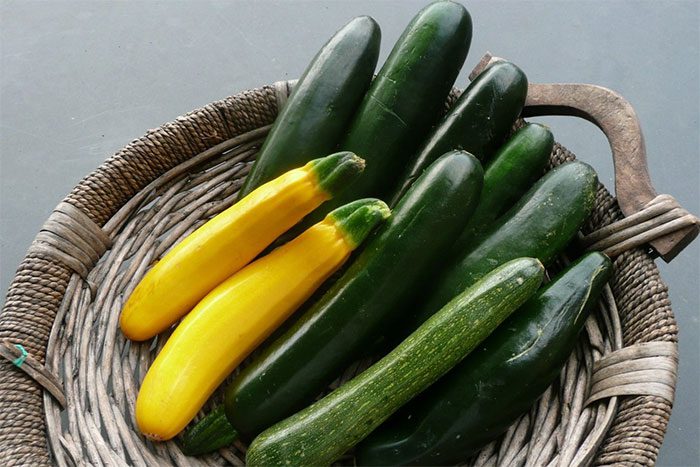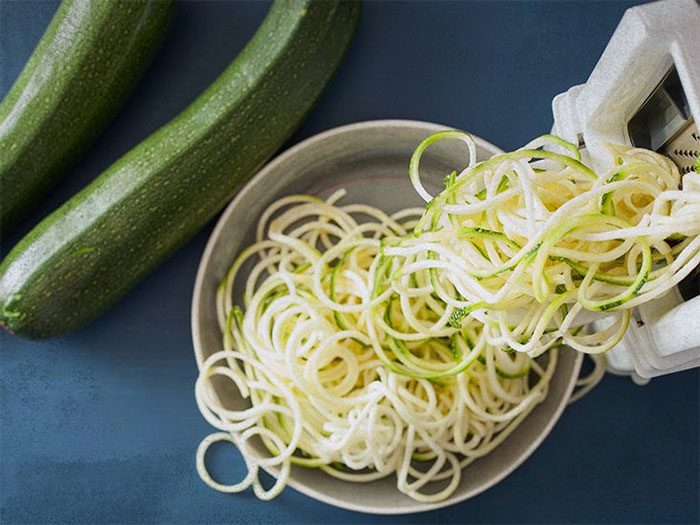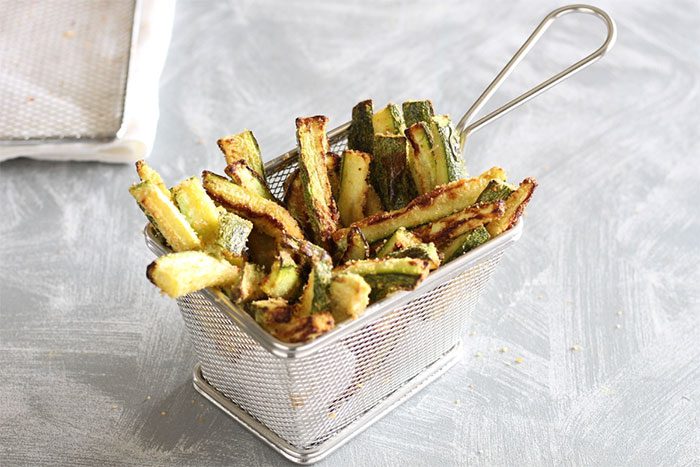Zucchini, also known as courgette, is typically planted in February to March and harvested in the summer. Zucchini has many health benefits, especially when you’re looking for suitable foods for a weight-loss diet.
Benefits of Zucchini
With its mild, sweet flavor, zucchini is added to many diets, appealing to Vietnamese tastes. Known for being rich in antioxidants, fiber, and vitamins such as A and C, zucchini can help combat diseases, is “friendly” to the gut, and benefits the skin.
1. Nutritional Value of Zucchini
Zucchini is rich in vitamins, minerals, and beneficial plant compounds.
According to statistics from the U.S. Department of Agriculture, 113g of zucchini contains:
- 19 calories
- 1g protein
- Less than
- 4g carbohydrates
- 1g fiber
- 3g sugar
When cooked, approximately 223g of cooked zucchini provides:
- 17 calories
- 1g protein
- Less than
- 3g starch
- 1g sugar
- 1g fiber
- 40% RDI of vitamin A (RDI – Recommended Daily Intake)
- 16% RDI of manganese
- 14% RDI of vitamin C
- 13% RDI of potassium
- 9% RDI of vitamin K
- 8% RDI of folate
- 8% RDI of copper
- 7% RDI of phosphorus
- 7% RDI of vitamin B6
- 5% RDI of thiamine.

Zucchini is a nutritious summer food. (Image: Internet).
Both the flesh and skin of zucchini provide nutrients such as fiber that promotes digestion, calcium that strengthens bones, magnesium that helps improve mood, potassium that aids muscle growth, and vitamin A that supports vision and boosts immunity. Furthermore, the antioxidants in zucchini help combat diseases, including vitamin C and polyphenols. Additionally, zucchini contains small amounts of iron, calcium, zinc, and other B vitamins.
Thus, it can be seen that raw zucchini provides seemingly similar nutritional components as when cooked, but with less vitamin A and more vitamin C.
2. Health Benefits of Zucchini
In folk medicine, zucchini is considered a remedy for treating colds, aches, and other health conditions. However, not all of these applications have scientific backing. Here are the researched health benefits of zucchini based on specific evidence.
2.1. Antioxidant Properties
Zucchini is rich in antioxidants that protect the body against damage caused by free radicals. Carotenoids such as lutein, zeaxanthin, and beta-carotene are particularly abundant in zucchini, according to a 2021 study published in Food Chemistry: Molecular Science.
These compounds benefit your eyes, skin, and heart, and also help protect the body against certain cancers such as prostate cancer. However, these studies are still limited to animals and test tubes, requiring further human data to accurately conclude how much zucchini extract is sufficient for cancer prevention.

Zucchini is rich in antioxidants that protect the body from damage caused by free radicals. (Image: Internet).
Some studies indicate that the skin of zucchini contains the highest antioxidant content, and yellow zucchini may have slightly higher levels than pale green zucchini.
2.2. Supports Healthy Digestion
Zucchini can promote a strong and smooth digestive process in several ways. Firstly, zucchini is high in water content, which helps soften stools, promote bowel movement, and reduce the risk of constipation.
Moreover, zucchini contains both soluble and insoluble fiber. Insoluble fiber adds bulk to the stool, helping food move through the intestines more easily and reducing the risk of constipation, especially if you drink enough water.
Meanwhile, soluble fiber creates an environment that nourishes beneficial gut bacteria, which help produce short-chain fatty acids (SCFAs) that nourish gut cells, reduce inflammation, and alleviate gastrointestinal disorders such as irritable bowel syndrome, Crohn’s disease, and ulcerative colitis.

Zucchini can promote a strong and smooth digestive process in several ways. (Image: Internet).
2.3. May Aid Weight Loss
Regularly consuming zucchini can help you lose weight due to its high water content and low calories, making you feel full longer. The fiber content in zucchini also helps reduce hunger and curb cravings. Furthermore, studies consistently conclude that eating more fruits and vegetables is effective for weight loss and reducing the rate of weight gain over time.
In a 2019 review published in Nutrients, researchers found that individuals with higher levels of carotenoids typically had lower BMI compared to those with lower carotenoid levels.
2.4. Protects Your Skin
Similar to how carotenoids accumulate in the skin of zucchini, they also accumulate in the skin when regularly consuming carotenoid-rich products. According to a 2019 review on antioxidants, the accumulation of antioxidants in the skin helps protect our skin from UV rays and pollution.
At the same time, consuming foods rich in carotenoids like zucchini also helps slow down the aging process by keeping the skin hydrated and more elastic and firm.

The accumulation of antioxidants in the skin, such as carotenoids in zucchini, helps protect our skin from UV rays and pollution. (Image: Internet).
2.5. Cardiovascular Health
According to a 2020 review in the BBA journal, consuming foods rich in carotenoids may slow or reduce the risk of developing cardiovascular disease. The potassium you get from zucchini is also good for blood pressure, and the fiber content benefits overall heart health.
2.6. Stabilizes Blood Sugar
The fiber in zucchini can help stabilize blood sugar levels. This is particularly important, as frequent spikes in blood sugar are linked to a higher risk of developing type 2 diabetes, according to Harvard T.H. Chan School of Public Health.
A 2016 article in NCBi also noted that fiber helps improve insulin secretion, a crucial hormone for maintaining healthy blood sugar levels. This is also true for blood cholesterol. According to the CDC, the high fiber content in zucchini helps eliminate bad cholesterol from the body through stool and protects the heart from the risk of heart disease and stroke.
Additionally, zucchini has other health benefits, including being good for the eyes, bones, thyroid, and prostate.

The fiber in zucchini can help stabilize blood sugar levels. (Image: Internet).
3. How to Eat Zucchini?
As mentioned earlier, raw zucchini provides seemingly similar nutritional components as when cooked, but with less vitamin A and more vitamin C. Therefore, depending on your needs, you can prepare zucchini in various ways. Note that due to its high water content, zucchini can become mushy when cooked; cut it into appropriate sizes and lightly salt it before cooking for 20-30 minutes, then pat it dry with paper towels to remove excess moisture. You can:
- Eat it raw directly in salads with other vegetables
- Stew it with summer vegetables
- Stuff it with rice or lentils for baking
- Sauté it with olive oil and garlic to enhance benefits
- Cook it in soups
- Batter and fry it, possibly adding eggs.
To keep zucchini green and fresh longer, store it whole in a dry, cool place or wrap it in a paper bag and place it in the refrigerator’s crisper drawer—avoid washing it first, as washing can cause it to spoil faster. Some people choose to preserve zucchini to retain its nutrients by cutting it into pieces, blanching in boiling water, and freezing. If stored this way in the freezer, it can last up to 12 months.
When buying zucchini, choose firm, shiny specimens without spots or shriveling.
And remember, although zucchini is packed with nutrients, like any food, it is not a substitute for medical treatments when you have existing health conditions.



















































